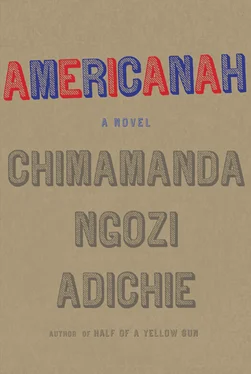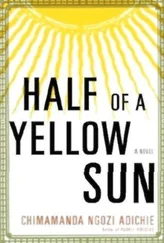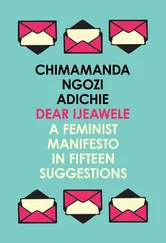Chetachi, who lived upstairs, asked Ifemelu, “Your mom said Aunty Uju’s mentor also gave her a loan for the car?”
“Yes.”
“Eh! Aunty Uju is lucky o!” Chetachi said.
Ifemelu did not miss the knowing smirk on her face. Chetachi and her mother must have already gossiped about the car; they were envious, chattering people who visited only to see what others had, to size up new furniture or new electronics.
“God should bless the man o. Me I hope I will also meet a mentor when I graduate,” Chetachi said. Ifemelu bristled at Chetachi’s goading. Still, it was her mother’s fault, to so eagerly tell the neighbors her mentor story. She should not have; it was nobody’s business what Aunty Uju did. Ifemelu had overheard her telling somebody in the backyard, “You see, The General wanted to be a doctor when he was young, and so now he helps young doctors, God is really using him in people’s lives.” And she sounded sincere, cheerful, convincing. She believed her own words. Ifemelu could not understand this, her mother’s ability to tell herself stories about her reality that did not even resemble her reality. When Aunty Uju first told them about her new job—“The hospital has no doctor vacancy but The General made them create one for me” were her words — Ifemelu’s mother promptly said, “This is a miracle!”
Aunty Uju smiled, a quiet smile that held its peace; she did not, of course, think it was a miracle, but would not say so. Or maybe there was something of a miracle in her new job as consultant at the military hospital in Victoria Island, and her new house in Dolphin Estate, the cluster of duplexes that wore a fresh foreignness, some painted pink, others the blue of a warm sky, hemmed by a park with grass lush as a new rug and benches where people could sit — a rarity even on The Island. Only weeks before, she had been a new graduate and all her classmates were talking about going abroad to take the American medical exams or the British exams, because the other choice was to tumble into a parched wasteland of joblessness. The country was starved of hope, cars stuck for days in long, sweaty petrol lines, pensioners raising wilting placards demanding their pay, lecturers gathering to announce yet one more strike. But Aunty Uju did not want to leave; she had, for as long as Ifemelu could remember, dreamed of owning a private clinic, and she held that dream in a tight clasp.
“Nigeria will not be like this forever, I’m sure I will find part-time work and it will be tough, yes, but one day I will start my clinic, and on The Island!” Aunty Uju had told Ifemelu. Then she went to a friend’s wedding. The bride’s father was an air vice marshal, it was rumored that the Head of State might attend, and Aunty Uju joked about asking him to make her medical officer at Aso Rock. He did not attend, but many of his generals did, and one of them asked his ADC to call Aunty Uju, to ask her to come to his car in the parking lot after the reception, and when she went to the dark Peugeot with a small flag flying from its front, and said, “Good afternoon, sir,” to the man in the back, he told her, “I like you. I want to take care of you.” Maybe there was a kind of miracle in those words, I like you, I want to take care of you , Ifemelu thought, but not in the way her mother meant it. “A miracle! God is faithful!” her mother said that day, eyes liquid with faith.

SHE SAID, in a similar tone, “The devil is a liar. He wants to start blocking our blessing, he will not succeed,” when Ifemelu’s father lost his job at the federal agency. He was fired for refusing to call his new boss Mummy. He came home earlier than usual, wracked with bitter disbelief, his termination letter in his hand, complaining about the absurdity of a grown man calling a grown woman Mummy because she had decided it was the best way to show her respect. “Twelve years of dedicated labor. It is unconscionable,” he said. Her mother patted his back, told him God would provide another job and, until then, they would manage on her vice-principal salary. He went out job hunting every morning, teeth clenched and tie firmly knotted, and Ifemelu wondered if he just walked into random companies to try his luck, but soon he began to stay at home in a wrapper and singlet, lounging on the shabby sofa near the stereo. “You have not had a morning bath?” her mother asked him one afternoon, when she came back from work looking drained, clutching files to her chest, wet patches under her armpits. Then she added irritably, “If you have to call somebody Mummy to get your salary, you should have done so!”
He said nothing; for a moment, he seemed lost, shrunken and lost. Ifemelu felt sorry for him. She asked him about the book placed facedown on his lap, a familiar-looking book that she knew he had read before. She hoped he would give her one of his long talks about something like the history of China, and she would half listen as always, while cheering him up. But he was in no mood for talk. He shrugged as though to say she could look at the book if she wanted to. Her mother’s words too easily wounded him; he was too alert to her, his ears always pricked up at her voice, his eyes always rested on her. Recently, before he was fired, he had told Ifemelu, “Once I attain my promotion, I will buy your mother something truly memorable,” and when she asked him what, he smiled and said, mysteriously, “It will unveil itself.”
Looking at him as he sat mute on the sofa, she thought how much he looked like what he was, a man full of blanched longings, a middlebrow civil servant who wanted a life different from what he had, who had longed for more education than he was able to get. He talked often of how he could not go to university because he had to find a job to support his siblings, and how people he was cleverer than in secondary school now had doctorates. His was a formal, elevated English. Their house helps hardly understood him but were nevertheless very impressed. Once, their former house help, Jecinta, had come into the kitchen and started clapping quietly, and told Ifemelu, “You should have heard your father’s big word now! O di egwu! ” Sometimes Ifemelu imagined him in a classroom in the fifties, an overzealous colonial subject wearing an ill-fitting school uniform of cheap cotton, jostling to impress his missionary teachers. Even his handwriting was mannered, all curves and flourishes, with a uniform elegance that looked like something printed. He had scolded Ifemelu as a child for being recalcitrant, mutinous, intransigent, words that made her little actions seem epic and almost prideworthy. But his mannered English bothered her as she got older, because it was costume, his shield against insecurity. He was haunted by what he did not have — a postgraduate degree, an upper-middle-class life — and so his affected words became his armor. She preferred it when he spoke Igbo; it was the only time he seemed unconscious of his own anxieties.
Losing his job made him quieter, and a thin wall grew between him and the world. He no longer muttered “nation of intractable sycophancy” when the nightly news started on NTA, no longer held long monologues about how Babangida’s government had reduced Nigerians to imprudent idiots, no longer teased her mother. And, most of all, he began to join in the morning prayers. He had never joined before; her mother had once insisted that he do so, before leaving to visit their hometown. “Let us pray and cover the roads with the blood of Jesus,” she had said, and he replied that the roads would be safer, less slippery, if not covered with blood. Which had made her mother frown and Ifemelu laugh and laugh.
At least he still did not go to church. Ifemelu used to come home from church with her mother and find him sitting on the floor in the living room, sifting through his pile of LPs, and singing along to a song on the stereo. He always looked fresh, rested, as though being alone with his music had replenished him. But he hardly played music after he lost his job. They came home to find him at the dining table, bent over loose sheets of paper, writing letters to newspapers and magazines. And Ifemelu knew that, if given another chance, he would call his boss Mummy.
Читать дальше













